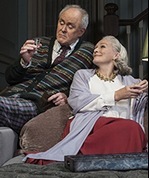Search Curtainup
SITE GUIDE
REVIEWS
REVIEW ARCHIVES
ADVERTISING AT CURTAINUP
FEATURES
NEWS
Broadway
Off-Broadway
NYC Restaurants
BOOKS and CDs
OTHER PLACES
Berkshires
London
California
New Jersey
DC
Philadelphia
Elsewhere
QUOTES
TKTS
PLAYWRIGHTS' ALBUMS
LETTERS TO EDITOR
FILM
LINKS
MISCELLANEOUS
Free Updates
Masthead
A CurtainUp Review
A Delicate Balance
|
I've had to rewrite only two lines-- making it clear that the topless bathing suits (for women, of course) are not made any more, and changing "our dear Republicans as dull as ever" to "brutal as ever". . .The play concerns-- as it always has, in spite of early-on critical misunderstanding-- the rigidity and ultimate paralysis which afflicts those who settle in too easily, waking up one day to discover that all the choices they have avoided no longer give them freedom of time. — Albee reflecting on his play in 1996, 30 years after it opened.
|

John Lithgow & Glenn Close
|
As it happens, I have a good memory of an outstanding production of this play presented at the McCarter Theater only a year ago (review ). Regrettably, there is a torpor that envelops this production, despite it having in its favor a top-drawer cast led by a top-flight director. That should have been enough to ensure some pleasure. This came only intermittently.
This play with its six characters who do a lot of talking and drinking — be it dense, stinging or funny or martinis, whiskey or brandy — can come off like a second cousin to Albee's blisteringly direct masterpiece Who's Afraid of Virginia Woolf very successfully revived four years ago. In contrast, to that play, Balance takes a more obscure, Pinteresque approach to its story of an unhappy marriage.
With this revival, and certainly unlike the gloriously cast and staged Lincoln Center production in 1996, one is very likely to think that Albee's ostensibly dense dialogue is simply being said without being savored. Credit for those aspects of the play that support its profundity along with theatricality, goes to director Pam MacKinnon for taking on the challenge and getting some of it right, mainly the prescribed illusiveness. However, there is not enough arresting acting to keep our attention focused on the extended reveries, redundant recriminations, and plethora of regrets.
You'll be convinced well before the play ends of just how indisputably loony are these lonely people. Heading the cast is Glenn Close as Agnes, whose presence is generally marked by a passive-aggressiveness that never varies or wavers even in the midst of the emotional mayhem surrounding her. More discomforting is the unattractive attire that costume designer Ann Roth has given her to wear as well as those on all the women in the cast.
As Agnes's pathetically withdrawn husband, John Lithgow, an actor who is rarely less than terrific, seems to be content waiting and watching the crazies about him. But that isn't enough to make him pitiable or really crazy even in his final off-the-wall tirade.
Put a vindictive, nasty, alcoholic on stage and you've got the potential scene-stealer. In the last Broadway revival in 1996, the late and great Elaine Stritch owned the role of Claire, Agnes's useless live-at-home sister. I'm not always sure what it means to be miscast, but the otherwise laudable British Tony Award-winner Lindsay Duncan makes a good case for it being neither sad, funny, pathetic or interesting at any given moment....before, between or after drinks.
How could the fine Martha Plimpton (The Coast of Utopia , Pal Joey , Top Girls ) be thrown by the role of Julia, the spoiled, depressed, three-times-divorced daughter currently in the throes of another separation? She is, however, thrown for a loop by a role that makes her act simply loopy.
Claire Higgins as Edna and Bob Balaban, as Harry are moderately effective as the unsettled and fearful neighbors who have more or less invited themselves to move in with their friends. There are essential elements that appear to be only vaguely considered in this production. Fear, foreboding, tension, desperation, all that make Albee's enigmatic play actor-accessible and director-worthy. Nothing much really happens to the people in this play, as you wonder why we should be watching them no matter how at home they appear to be in Santo Loquasto's elegant living room.
|
Delicate Balance by Edward Albee Directed by Pam MacKinnon Cast: Glenn Close (Agnes), John Lithgow (Tobias), Lindsay Duncan (Claire), Bob Balaban (Harry), Clare Higgins (Edna) and Martha Plimpton (Julia). Set, Santo Loquasto Costumes, Ann Roth Lighting, Brian MacDevitt Sound, Scott Lehrer Stage manager, Roy Harris From 10/20/14; opening 11/20/14; closing 2/22/15 Running time: 2 hours and 24 minutes, 1 intermission Reviewed by Simon Saltzman |
|
REVIEW FEEDBACK Highlight one of the responses below and click "copy" or"CTRL+C"
Paste the highlighted text into the subject line (CTRL+ V): Feel free to add detailed comments in the body of the email. . .also the names and emails of any friends to whom you'd like us to forward a copy of this review. For a feed to reviews and features as they are posted add http://curtainupnewlinks.blogspot.com to your reader Curtainup at Facebook . . . Curtainup at Twitter Subscribe to our FREE email updates: E-mail: esommer@curtainup.comesommer@curtainup.com put SUBSCRIBE CURTAINUP EMAIL UPDATE in the subject line and your full name and email address in the body of the message. If you can spare a minute, tell us how you came to CurtainUp and from what part of the country. |

|


 Book of Mormon -CD
Book of Mormon -CD